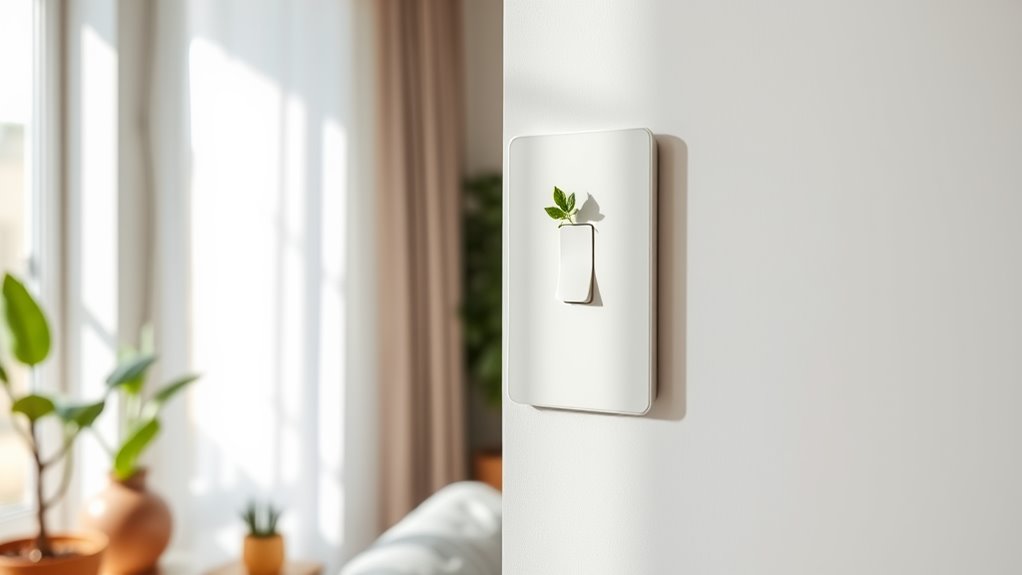This Eco-Friendly Switch Saves Money Too!
Making eco-friendly switches not only helps the planet but also saves you money. By using reusable bags and containers, buying in bulk, and choosing energy-efficient appliances, you’ll lower your expenses over time. Composting food scraps enriches your garden while reducing waste, and repairing items instead of tossing them can greatly cut costs. You’ll feel good about your choices and notice the savings add up. Discover more ways to make a positive impact and keep your wallet happy.
Key Takeaways
- Using reusable bags, bottles, and containers reduces the need for single-use plastics, saving money on frequent purchases.
- Bulk buying not only cuts packaging waste but also offers significant savings on groceries.
- Energy-efficient appliances lower monthly utility bills, resulting in long-term financial savings.
- Making DIY cleaning products is cheaper and minimizes reliance on expensive, harmful chemicals.
- Composting food scraps enriches gardens while reducing waste disposal costs and supporting a sustainable lifestyle.
The Benefits of Going Green
When you embrace eco-friendly practices, you’re not just helping the planet—you’re also saving money. Implementing zero waste living tips can significantly cut down your expenses.
For instance, by reducing single-use plastics, you’ll find yourself buying fewer items overall. Reusable bags, containers, and straws might require an initial investment, but they’ll pay off in the long run as you avoid constant repurchases.
You can also save by composting food scraps instead of throwing them away, which reduces waste and enriches your garden. Moreover, adopting zero waste living practices can lead to long-term financial benefits through reduced consumption and waste disposal costs.
Additionally, DIY cleaning products often cost less than store-bought ones and are better for your health.
Adopting these habits not only benefits your wallet but also fosters a sustainable lifestyle that contributes positively to the environment.
Understanding Zero Waste Living
Zero waste living isn’t just a trend; it’s a powerful way to reduce your environmental impact while saving money.
By understanding its core principles, you’ll discover practical tips that make it easier to cut down on waste.
Embracing this lifestyle can lead to a cleaner planet and a healthier wallet.
Principles of Zero Waste
Although embracing a zero waste lifestyle may seem daunting at first, understanding its core principles can simplify the journey toward sustainability.
At its heart, zero waste encourages you to refuse, reduce, reuse, recycle, and rot. Start by refusing unnecessary items, like single-use plastics or promotional freebies.
Next, reduce what you consume by choosing quality over quantity. Reusing is all about finding new purposes for items you already have; think creatively!
Remember, recycling should be a last resort—aim to minimize waste before it even reaches that stage. Finally, composting organic waste returns nutrients to the earth, closing the loop.
Benefits of Reducing Waste
Embracing a zero waste lifestyle not only benefits the planet but also offers numerous advantages for you personally.
By reducing waste, you’ll often find yourself saving money. Think about it: cutting down on single-use products means fewer trips to the store and less spending on unnecessary items.
Plus, you’ll likely develop a more mindful approach to consumption, leading to better quality purchases that last longer. You’ll also declutter your space, creating a more serene environment.
As you shift towards sustainable alternatives, you’ll discover creative and fulfilling ways to repurpose items, making everyday life more engaging.
Ultimately, adopting zero waste principles can enhance your well-being, foster community connections, and empower you to make a positive impact.
Practical Zero Waste Tips
Have you ever wondered how simple changes in your daily routine can lead to a more sustainable lifestyle? Embracing zero waste living doesn’t have to be overwhelming.
Start by saying goodbye to single-use plastics. Bring your own reusable bags, bottles, and containers everywhere you go.
Next, opt for bulk buying—this not only cuts down on packaging waste but often saves you money too!
Consider composting your food scraps to reduce landfill waste while enriching your garden. You can also swap disposable items for sustainable alternatives, like cloth napkins instead of paper.
Lastly, make it a habit to repair rather than replace your items.
These practical tips can transform your everyday life, making sustainability not just achievable but enjoyable!
Simple Swaps for Everyday Items
Here are a few easy changes you can make:
- Reusable shopping bags instead of plastic ones
- Beeswax wraps in place of plastic wrap
- Bamboo toothbrushes instead of plastic ones
- DIY cleaning solutions using vinegar and baking soda instead of store-bought cleaners. These solutions can be just as effective as commercial cleaners while being safer for your home and the environment, making them a great eco-friendly option.
These small adjustments not only reduce waste but also lower your expenses in the long run.
Energy-Efficient Appliances: A Smart Investment
Investing in energy-efficient appliances isn’t just good for the planet; it can also significantly cut down your energy bills.
By using less energy, these appliances help you save money in the long run, making them a smart choice for any budget.
Plus, you’ll enjoy the added benefit of modern technology and improved performance in your home.
Reduced Energy Consumption
When you choose energy-efficient appliances, you’re not just making a smart investment for your wallet; you’re also contributing to a more sustainable future.
These appliances consume significantly less energy, which means lower utility bills and a reduced carbon footprint.
Here are some benefits you’ll enjoy:
- Lower Energy Bills: Save money each month with appliances that use less electricity and water.
- Eco-Friendly Choice: Help reduce greenhouse gas emissions and conserve natural resources.
- Improved Performance: Enjoy the latest technology that often offers better performance and efficiency.
- Increased Home Value: Energy-efficient homes are attractive to buyers, potentially boosting your property value.
Long-Term Savings Potential
Although many people focus on the initial costs of energy-efficient appliances, the long-term savings they offer can significantly outweigh that upfront investment.
By using less energy, these appliances can lower your utility bills month after month, leading to substantial savings over time. For instance, energy-efficient refrigerators or washing machines may save you hundreds of dollars annually.
Plus, many of these appliances come with warranties that can further protect your investment. You’re not just saving money; you’re also enhancing your home’s value and reducing your carbon footprint.
In the long run, the smart choice is clear: investing in energy-efficient appliances means more savings in your pocket and a healthier planet for future generations.
Reducing Food Waste for Savings
By cutting down on food waste, you can’t only help the environment but also save a significant amount of money each month.
Here are some simple tips to get you started:
-
Plan your meals: Create a shopping list based on what you need to avoid impulse buys.
-
Use leftovers creatively: Transform yesterday’s dinner into a new meal to reduce waste.
-
Store food properly: Learn the best ways to keep fruits and veggies fresh longer.
-
Compost scraps: Instead of throwing away scraps, compost them to enrich your garden.
Implementing these strategies can drastically decrease your grocery bills while contributing to a sustainable planet.
You’ll be amazed at how small changes can lead to big savings!
DIY Cleaning Products: Eco-Friendly and Affordable
Many people don’t realize that making your own cleaning products can be both eco-friendly and budget-friendly. By using simple ingredients like vinegar, baking soda, and essential oils, you can whip up effective cleaners that are safe for your home and the planet.
For instance, a mixture of vinegar and water can tackle windows and surfaces, while baking soda is great for scrubbing stubborn stains. Not only do these DIY solutions minimize harmful chemicals, but they also save you money compared to store-bought options. Plus, you can customize scents and strengths to your liking! So why not give it a try? You’ll enjoy a cleaner home while reducing your carbon footprint and keeping more cash in your wallet.
Additionally, using these natural ingredients can help freshen your home naturally while ensuring a healthier living environment for your family.
Embracing a Minimalist Lifestyle
As you navigate through life, embracing a minimalist lifestyle can transform not only your surroundings but also your mindset.
By simplifying your life, you’ll discover a sense of freedom and clarity that enhances your overall well-being. Here are some key benefits of minimalism:
-
Reduced Stress: Fewer possessions mean less clutter and chaos, helping you focus on what truly matters.
-
Financial Savings: By buying less, you save money and can invest in experiences rather than things.
-
Environmental Impact: A minimalist approach encourages sustainable choices, reducing waste and promoting eco-friendliness.
-
Increased Productivity: With a decluttered space, you can concentrate better, leading to higher efficiency in your daily tasks.
Additionally, adopting a minimalist lifestyle often leads to easy eco-friendly swaps that further contribute to a sustainable future. Embrace minimalism and watch how it enriches your life both materially and spiritually.
The Impact of Conscious Consumerism
When you choose eco-friendly products, you’re not just making a positive impact on the environment; you’re also setting yourself up for financial savings.
Conscious consumerism can lead to smarter purchasing decisions that reduce waste and lower long-term costs.
Eco-Friendly Purchasing Choices
Though it might seem that individual purchases have little impact, each eco-friendly choice you make contributes significantly to a larger movement toward sustainability.
By opting for environmentally conscious products, you’re not just making a personal statement; you’re influencing industries and encouraging greener practices.
Here are a few eco-friendly purchasing choices to consider:
- Choose reusable bags over single-use plastic.
- Opt for products with minimal or recyclable packaging.
- Support local businesses that prioritize sustainable practices.
- Select organic or ethically sourced food options.
These small shifts in your buying habits can lead to a collective change, fostering a healthier planet for future generations.
Financial Benefits of Sustainability
Making eco-friendly choices not only benefits the planet but can also lead to significant financial savings. By opting for sustainable products, you often reduce long-term costs. For instance, energy-efficient appliances might’ve a higher upfront price but save you money on utility bills over time.
Choosing reusable items over single-use products can also cut down on your shopping expenses. Conscious consumerism encourages brands to adopt greener practices, often leading to competitive pricing and better quality products.
Additionally, many companies offer discounts or incentives for eco-friendly purchases, further enhancing your savings. Ultimately, aligning your purchasing habits with sustainability not only supports the environment but can also put money back in your pocket.
It’s a win-win for both you and the planet!
Eco-Friendly Transportation Options
As cities grow and environmental concerns mount, embracing eco-friendly transportation options isn’t just a trend—it’s a necessity.
By choosing sustainable ways to get around, you can reduce your carbon footprint while enjoying a variety of benefits. Here are some options to consider:
-
Bicycles: Great for short distances, they promote fitness and reduce traffic congestion.
-
Public Transit: Buses and trains can significantly lower emissions per passenger compared to cars.
-
Carpooling: Sharing rides with others cuts down on the number of vehicles on the road.
-
Electric Vehicles (EVs): They produce zero tailpipe emissions and often come with incentives.
Making the switch to these options not only helps the planet but can also lead to a more enjoyable and cost-effective commuting experience.
Tracking Your Savings: A Budget-Friendly Approach
When you start tracking your savings, you’ll quickly see just how much your eco-friendly choices can impact your budget. By keeping an eye on your expenses, you’ll notice patterns and opportunities to save even more. Use the table below to compare your traditional and eco-friendly options.
| Eco-Friendly Choice | Monthly Savings | Annual Savings |
|---|---|---|
| LED Bulbs | $5 | $60 |
| Reusable Bags | $10 | $120 |
| Public Transport | $30 | $360 |
| Composting | $15 | $180 |
As you can see, these small changes add up. Start tracking today, and watch your savings grow while you contribute to a healthier planet!




